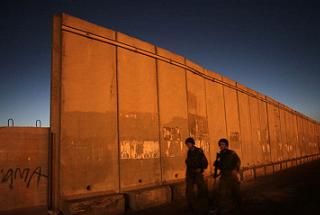 Qalandia, photo by Oren Ziv, Activestills
Qalandia, photo by Oren Ziv, ActivestillsGeneral background:
In 2001 the Israeli government passed a decision to construct a barrier that would separate between Israel and the West Bank, following numerous terror attacks across the country. The route chosen, in the Jerusalem area and elsewhere, deviated from the route of the 1949-1967 border also known as the Green Line.
The construction of the Separation Barrier around Jerusalem left tens of thousands of Palestinian Jerusalemites on the ‘other’ side of the barrier, cut off from the rest of the city. Most of these are holders of Israeli I.D cards who had become permanent residents of Israel following the annexation of East Jerusalem and its environs in 1967. Today, they are required to enter Jerusalem through checkpoints daily on their way to work, school, medical treatment, family visits, and so forth. For this reason, many have chosen to leave their neighborhoods and relocate to areas not cut off by the barrier.
Basic Facts:
- Qalandiya Crossing (also known as Atarot) is the largest crossing in the Jerusalem area, located in the north.
- It is operated today jointly by the police, the army, and private security guards hired by the Defense Ministry. The police are at present officially in charge of the crossing, after they were handed down that responsibility from the army.
- The crossing is used for vehicles and pedestrians and remains open 24/7.
- Qalandiya serves Palestinian Jerusalemites (holders of Israeli I.D) as well as Palestinians from the West Bank who have acquired entry permits from the army, usually for work reasons. A biometric system identifies permit holders by hand print.
- According to police data provided to ACRI in September 2009, some 20,000 people passed through Qalandiya daily. Of them, 14,000 were holders of Israeli I.D cards and 6,000 holders of a Palestinian I.D card with relevant entry permits.
Freedom of Movement:
ACRI and others had filed several petitions in 2004-2005 against the construction of the Separation Barrier in the Jerusalem area.
- In its ruling, the High Court ordered the State to ensure regular passage and short waiting periods at all times: “Only a few moments for vehicles and pedestrians and during rush hour up to 15 minutes for vehicles and 25 minutes for pedestrians”. It explained that if entry through Qalandiya of Palestinian Jerusalemites “will not entail substantial waiting periods then it will be wrong to claim [as ACRI had claimed] that rights have been violated” due to its construction.
- However, this was not upheld. Waiting periods can be an hour and more during rush hour, especially in the early morning hours and during holidays. The Court added that “if this outlined daily routine is not kept, the petitioners maintain the right to return to this court and argue their case”. ACRI is at present considering returning to the court and petitioning on this matter.
Children’s Rights
Passing through a checkpoint can be an unpleasant and stressful experience for adults, let alone for children. Throughout the years, ACRI has demanded from the authorities:
- That the humanitarian lane – intended mainly for the sick and elderly but also for the use of children and women – remain open, especially as children are leaving for school or returning from school
- That children not be required to step off vehicles and pass the crossing on foot, especially when alone and not accompanied by a parent or relative
- That school students not be required to show an original birth certificate at the crossing to prove that they are minors (a copy of the certificate would do just fine)
Human Dignity
Though some good will and appropriate handling is seen in Qalandiya:
- Palestinians repeatedly complain of verbal abuse and insults, and of a general attitude of disrespect toward them, for example soldiers who talk on their cell phones instead of treating those waiting in line.
- Women complain that the humanitarian lane remains closed at times, and they are forced to squeeze in the same line with the men, which is considered undignified in Islamic culture
- At times, personnel close lanes or prevent entry for a period of time as a “penalty for bad behavior”, collectively punishing everyone.
- There is no requirement to have an Arabic-speaker present at the crossing, and pleas of Palestinians to the staff are at times overlooked because of miscommunication.
Services to Neighborhoods:
Neighborhoods located inside the Jerusalem municipality border, and which were cut off by the barrier, continue to receive services from the municipality – but of a far lesser quality:
- Roads and sewage pipes are not maintained nor repaired
- Garbage and sanitation services have been privatized
- Welfare and health services have deteriorated, and receiving them elsewhere is a hassle due to the barrier and the crossings
- Law enforcement is practically non-existent, leading to sharp rise in crime and drug use
- Palestinian ambulances cannot pass into Jerusalem, Israeli ambulances cannot pass past the checkpoint – so patients are carried across from one ambulance to another







